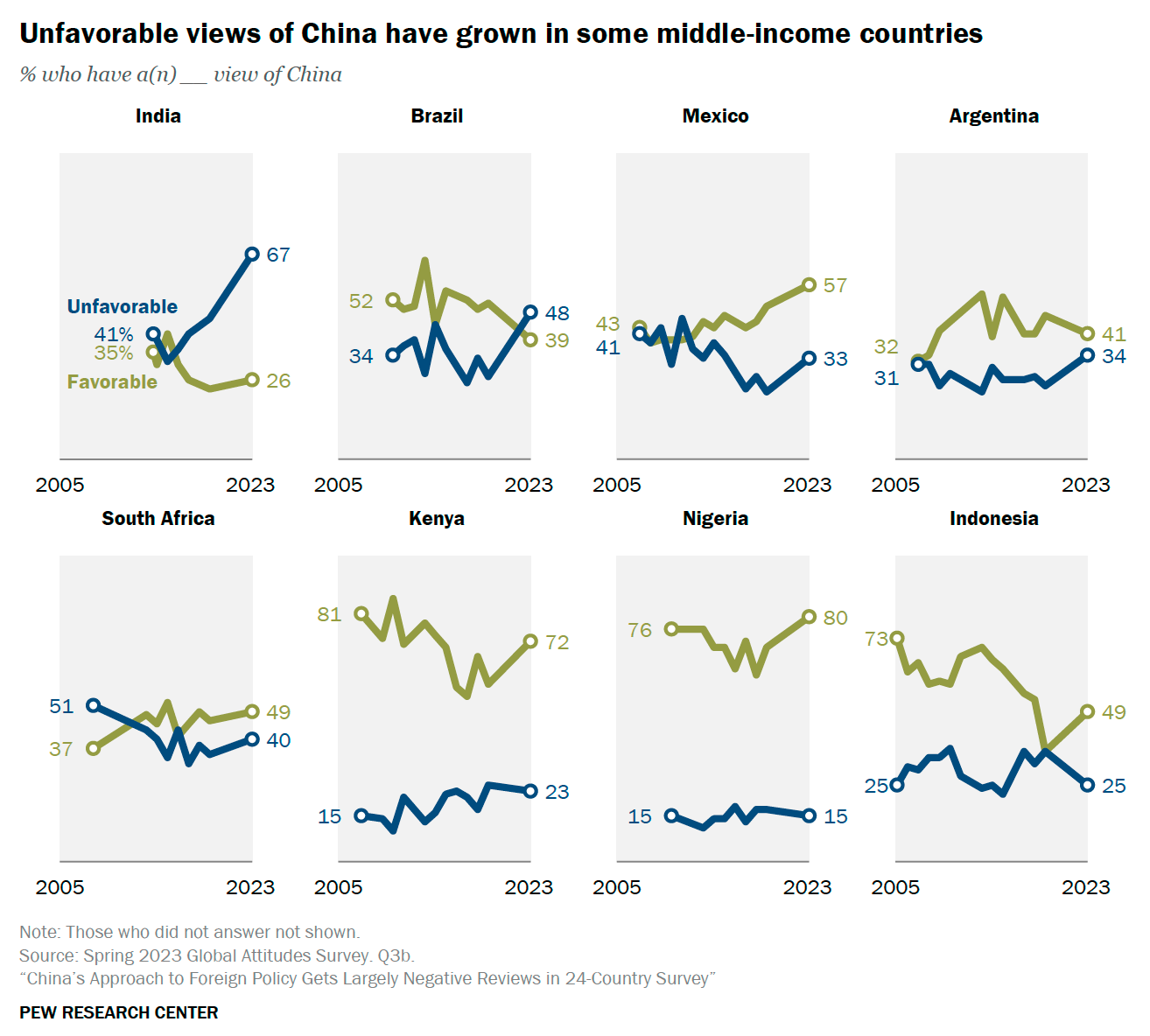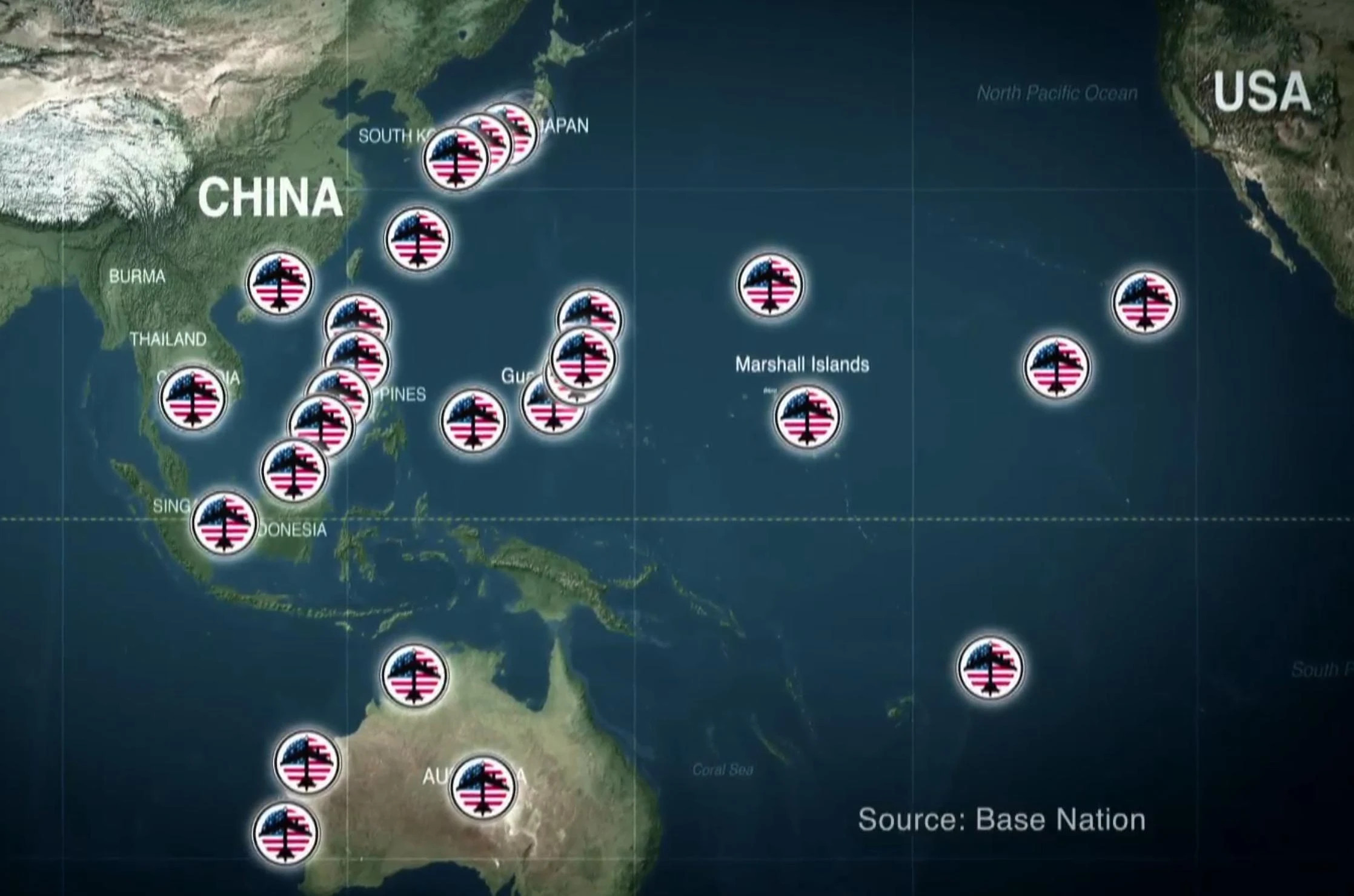Seeing just how quickly and completely the anti-China hysteria took hold has definitely been a stark demonstration of just how effective our centralized western media is at shaping popular opinion.
Its really not that difficult to play on simpletons emotions when you run a massive media conglomerate.
Public opinion manipulation becomes very evident when it's visualized. You can see the opinions quickly invert as the media narrative changed from positive to negative here

https://www.pewresearch.org/global/2023/07/27/views-of-china/
The real tragedy is that most people don't realize just how much their views are being manipulated and how easy it is to do that. People think themselves as being rational and informed, and that they couldn't possibly fall for cheap propaganda tactics. Yet, as the chart above clearly shows their views can be shifted from their current position to a completely opposite one in a very short time span.
Same thing is happening to India before our eyes.
Thing is, the Western view that media is free inherently makes people more susceptible to propaganda. To be more precise, Western media has achieved a few things: (1) The illusion of media freedom makes people less likely to question the media they consume. (2) The profit-driven motive of media companies makes it more likely for facts to be "reinterpreted" to better fit the target reader's worldview. (3) The extent that government agencies are involved in media has been completely hidden from the public.
Completely agree, the advantage of western approach is that it creates an illusion of freedom and since people want to believe that their society is free, they tend to choose to believe it.
It's a geopolitical statement. The US always needs an enemy to justify their egregiously high military budget, but, well, the USSR collapsed and the War on Terror is basically over.
Now, the US drops military bases in Southeast Asia like they're candy and acts like that's totally not a provocative measure (unlike, say, putting a Soviet military base in Cuba).
Even today, India is slowly shifting away from being America's media darling because of their policy of self-interest... soon, they'll be lumped in with China as being one of those "bad" countries that are "America's enemy."
Look at the downvotes here too. Lemmy has a serious orientalism problem. Anglos just cannot accept even the possibility that another country is not as evil as theirs is. For them, its psychologically satisfying for the victims of hundreds of years of colonialism to be morally equal to the colonialists. Outright racism, pure and simple.
Lemmy has a serious orientalism problem. Anglos just cannot accept even the possibility that another country is not as evil as theirs is.
I think the west has a hard time separating their overarching theory of race and the actual history of ethnic conflict Asia.
Even when leftist on Lemmy speaks in terms of ethnicity you tend to conflate racial and ethnic terminology. Orientalism is a term that originates to near east cultures, particularly Islamic ones.
I mean, illegally claiming other nations territorial waters because of outdated nationalistic attitudes is pretty provocative...kinda pushes South East Asian nations to ask for US bases as a hedge against their imperialist neighbor. They're just picking the lesser of two evils.

Other nations "territorial waters?"
For fucks sake. Let's go through things piece by piece, remembering that China and Taiwan have completely aligned claims by policy.
The Paracels are within 200nm and outside 12nm of both China and Vietnam (and, for what it's worth, were granted to China by North Vietnam prior to the Vietnam War and that China kicked the South Vietnamese from the islands after they occupied them during the Vietnam War).
The Spratlys are disputed between China/Taiwan, the Philippines, Malaysia, Vietnam, and Brunei. These islands are in no country's territorial waters, which is the entire reason for the dispute in the first place: a successful claim to these islands significantly expands a country's EEZ and territorial waters in the region. Both Vietnam and China/Taiwan make claims in the area based on historical precedent, while the Philippines, Brunei, and Malaysia make claims based on their EEZ extending to those islands, and those islands must thus also be part of their EEZ (and, since they're clearly territory, expand their EEZ further). Again, these islands are in nobody's territorial waters, which is the entire point of the debate.
Scarborough Shoal is about 198km from the nearest point in the Philippines and, again, does not fall within Filipino territorial waters.
Given that we've established that these islands are not in a country's territorial waters, let's take a closer look at what can be claimed based on the lawful methods for acquisition of sovereignty: effective occupation, cession, prescription, conquest, and accretion.
These basically involve projecting ownership over an island (e.g. by building outposts on it, or conquering it, or otherwise making the island their removed). You can feel free to extrapolate these conditions onto each of the above cases, but you'll find that the Chinese claims are rather strong given these lawful methods for acquisition of sovereignty. They are not absolute, which is why there's still dispute, but it's not like their claims are entirely unreasonable under international law (even if the obsession with the nine-dash line rather than other mechanisms for actually gaining sovereignty is probably harming their case). Most notably, the Paracels should fall very clearly under either effective occupation or conquest and I'm really not sure why Vietnam is so adamantly protesting this issue given that their claim is so weak.
This is just straight up true. Besides the belligerence and racism it pushes, it also makes it near impossible to have an actual, reasonable and critical comparative discussion of Chinese and Western societies. It closes any space that might exist for Chinese people to take part in any discussion of international affairs, since the attitude is so strongly against them. This pushes any open minded Chinese netizen back into the arms of their own government's propaganda, rather than inviting them into an open discussion of the good and bad sides of their and other societies.
I mean, it's not like Chinese people are stupid. We know what's wrong with society in mainland China, but we also see all the benefits that it's brought. The fact that it isn't talked about doesn't mean that everyone's bought into government propaganda, it just means that people are on average happy enough to not bother with it.
Flipping the firewall is easy. Going to Taiwan or Hong Kong is easy. Emigrating is easy.
Just because someone isn't white doesn't mean that they're stupid ffs
Oh sure, didn't mean to imply that Chinese people weren't smart enough to think for themselves. I was just making the point that neither western media nor Chinese media is helping at all to create space or goodwill for critical exchange and debate across boundaries and firewalls (which, to be fair, is not surprising).
Glad to see there are actually Chinese netizens on Lemmy, by the way.
I mean, that's the entire point, right? Media doesn't exist to show the truth, it exists to manufacture consent for some policy direction. If media was supposed to be factual, it wouldn't be funded by biased actors and it wouldn't have an incentive structure that rewards profits more than factual reporting.

yeah its been pretty on the charts for how western media normally portrays china
i dont think its ever been great
World News
News from around the world!
Rules:
-
Please only post links to actual news sources, no tabloid sites, etc
-
No NSFW content
-
No hate speech, bigotry, propaganda, etc